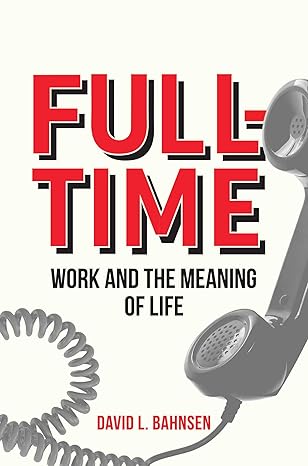A Brief Book Summary from Books At a Glance
by Joshua K. Smith
Table of Contents
Forward
Introduction
1 A Crisis of Despair
2 The Current Pandemic
3 Created for What?
4 The Sermon You’ll Never Hear
5 Money and Ambition
6 The Economic Case
7 Retirement Disaster
8 Moving from Halftime to Full-time
9 Pouting Pulpits & Part-time Pastors
10 “Imbalancing” Act
Conclusion
Appendix
Overview
This book argues that a pervasive sense of despair and unhappiness in modern society stems from a misunderstanding of work’s purpose and value. He challenges the prevalent notion that work is merely a means to an end (financial freedom, retirement, etc.), instead proposing that work itself is inherently good and deeply connected to human identity and fulfillment.
Author
David L. Bahnsen is a prominent American financial advisor, author, and speaker. He’s the founder and managing partner of The Bahnsen Group, a wealth management firm. Bahnsen is known for his strong advocacy of free markets and free enterprise, often expressing his views through his weekly podcast, Capital Record, and his writings on economics and finance. He’s a frequent guest on various financial news outlets. His work often blends a strong commitment to free market principles with a deeply held Christian faith, integrating his economic and theological perspectives in his analyses and arguments.
Book Summary
Chapter 1: A Crisis of Despair: Dignity and Earned Success
The rising rates of depression, suicide, substance abuse, and social isolation, are not merely individual issues but symptoms of a deeper cultural problem. This isn’t a simple matter of personal failings but reflects a significant disconnect between individual experience and the perceived meaning of life. This chapter directly contrasts the commonly held notion that work is solely a means to an end (survival, financial security) with a more holistic understanding of work’s importance, citing Dorothy Sayers’s perspective that work should be a complete expression of the worker’s faculties (p. 12). This sets the stage for his central argument: work is not merely a means to an end but is the meaning of life (p. 12). Evidence of fulfillment in work found in my father’s work has deeply shaped my theology of work (pp. 34-35). This personal experience serves as a springboard to introduce the concept of “earned success” (p. 35), emphasizing that the intrinsic satisfaction derived from achieving something through effort transcends mere temporal diversion. This is contrasted with fulfillment with the societal emphasis on “medicating through achievement” (p. 36), making a clear distinction between unhealthy coping mechanisms and the restorative power of meaningful work in overcoming trauma. . . .
[To continue reading this summary, please see below....]The remainder of this article is premium content. Become a member to continue reading.
Already have an account? Sign In
